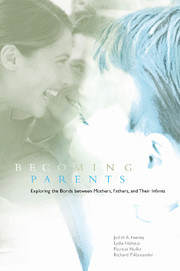Book contents
- Frontmatter
- Contents
- Preface
- 1 The Transition to Parenthood
- 2 Attachment in Childhood and Beyond
- 3 The Study
- 4 The Couples
- 5 Pregnancy and Plans for Birth
- 6 Couples' Experiences of Birth and New Parenthood
- 7 How Does New Parenthood Affect Couples?
- 8 Dealing with Depression
- 9 Men, Women, and Household Work: The Diaries
- 10 Couples' Changing Attachment Relationships
- 11 Six Months into Parenting
- 12 New Parenthood in Perspective
- Appendix A Core Questionnaires Completed by Couples
- Appendix B Summary of Sample Characteristics
- Appendix C Summary of Major Statistical Analyses
- References
- Author Index
- Subject Index
12 - New Parenthood in Perspective
Published online by Cambridge University Press: 05 June 2012
- Frontmatter
- Contents
- Preface
- 1 The Transition to Parenthood
- 2 Attachment in Childhood and Beyond
- 3 The Study
- 4 The Couples
- 5 Pregnancy and Plans for Birth
- 6 Couples' Experiences of Birth and New Parenthood
- 7 How Does New Parenthood Affect Couples?
- 8 Dealing with Depression
- 9 Men, Women, and Household Work: The Diaries
- 10 Couples' Changing Attachment Relationships
- 11 Six Months into Parenting
- 12 New Parenthood in Perspective
- Appendix A Core Questionnaires Completed by Couples
- Appendix B Summary of Sample Characteristics
- Appendix C Summary of Major Statistical Analyses
- References
- Author Index
- Subject Index
Summary
“When the baby is not happy about something, this means that my wife is not happy, and this means that I'm not happy – so it's a challenge, but you try to figure out what's wrong and correct the problem.”
Throughout this book, we have seen that responses to new parenthood varied enormously from couple to couple. In addition, the patterns of relationship functioning that couples reported at the end of the study were rather different from those evident soon after the birth. Clearly, the transition to parenthood is an ongoing process, and change is not restricted to the weeks immediately following the birth. In this chapter, we sum up the main findings of the study, and discuss the implications for new parents and those wishing to help and support them.
DIVERSITY OF EXPERIENCE
It has been known for many years that overall relationship satisfaction can decline following the birth of the first baby. However, one of the unique features of this study has been the focus on specific aspects of relationship satisfaction that are likely to be affected by the addition of the new family member. Based on couples' reports of their recent feelings about their relationships, it seems that declines in satisfaction occurred mainly in the areas of expressions of affection and understanding, and quality and quantity of time together. In other words, couples tended to be dissatisfied with the lower levels of intimacy they were experiencing.
- Type
- Chapter
- Information
- Becoming ParentsExploring the Bonds between Mothers, Fathers, and their Infants, pp. 202 - 220Publisher: Cambridge University PressPrint publication year: 2001



